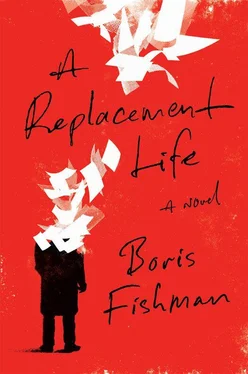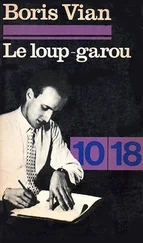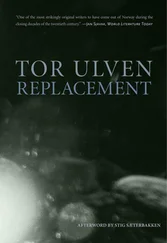“If I had kept lying, you would have felt even more betrayed. But because I told you, I forced you into it?”
“You’re right, Slava, this situation is so unfair to you. You try to do the right thing, but the world won’t notice.”
He groaned.
“Did you know what you were going to do when you promised me you would tell the truth?” she said. “Just tell me that. Did you come here simply to share the burden?”
“No,” he said. “I don’t think so. I’m—” He felt a great unhappiness rising within him. “I’m trying to be honest.”
“It doesn’t matter, does it,” she said despondently. “Whenever you did know, you didn’t come to me. You didn’t tell me.”
“Probably I didn’t know until I walked into his office,” he said. “I’m telling you now. Arianna, please.”
“Oh, I know,” she yelped, and covered her face.
She crossed her legs and looked outside while her teeth worked the edge of her nails. He had never seen her do that. In the window, an old tree swayed tentatively in a light wind. A finger-sized bird, iridescent with emerald plumage, skidded onto a branch, unshamed by its meagerness from setting the bulb of its head at a magnificent angle. The branch swayed a little in answer. Unlike Slava’s windows, which looked into a courtyard, Arianna’s faced into the city. He felt quieter but lonelier at his place.
“Please go,” she said. “I’m not strong enough to insist on it.”
“Arianna,” he whispered. “No.”
“I love when you call out my name,” she said. “You do it rarely. You called it out during sex once… I knew it was because you were so gone, you’d forgotten I was there. I loved that.”
He was on the floor beside her again. “Arianna, it’s over. Don’t you see?”
Her face twitched and she drew a finger under one eye. “Don’t you see? You didn’t take me with you into that room. We agreed you would tell the truth. But you didn’t. At the last moment, you changed your mind. You left me at the door, you looked only after yourself. But how else could it be? You’ve been answering to someone for so long. Oh, why are these things impossible to see in advance. You’re not up to this now, Slava. And I don’t want you like this. Please go.”
His insides drained. He wobbled, trying to stand up. He had become so accustomed to her understanding that he didn’t know what to do when she withheld it. He scratched out her name, all he could say.
“I can’t do this with you now,” she said. “Tomorrow we’ll talk — next week. Please go. Be kind to me and go.”
“You’re not a Boy Scout, Arianna,” he mumbled. “Pick and choose? You don’t care about the rules.”
“Don’t I?” she said. “I do care about the rules, Slava. The rules that we have with each other, I do.”
He felt bewilderment. How could he know that this rule, for her, was the unbreakable one? There were so many others that didn’t matter. He could follow instructions — he would now, he would — but not without receiving them in the first place! Once again, he felt himself in the presence of information only he didn’t understand. Everyone was slightly embarrassed that he didn’t.
“You know, Slava,” she said without looking at him, “when it started and we disagreed all the time, I liked it. I’d rather disagree with someone who’s interesting. Also because those disagreements felt like the frosting; underneath we were the same. But I was wrong, Slava. We are different — all the way through.”
“But I want to be like you.”
“But I’m not looking for a student. And you are not looking for a teacher.” She sighed heavily and walked to her bureau. When she returned, she held an old issue of Century . “Happy freedom,” she said.
It was the issue from all those years ago, the first issue of Century he had come across, in the Hunter library.
“I stole it,” she said. “From the archive.” She laughed barbarously.
He didn’t want to — if he took it, he was agreeing to something. But he didn’t dare disobey. His heart curdled at the foxed feel of the old, tawny pages.
“‘Now she snaps her wings open, and floats away,’” she said bitterly.
He called out her name again, but she looked at him with such a helpless, crazed expression that he understood the loving thing would be to go. Holding the magazine, he did.
SATURDAY, OCTOBER 14, 2006
What do the holy books say about the paying of respects to the deceased on the Sabbath? Is it a form of work, prohibited on the sacred day, or a kind of rest? There is no Arianna to ask. Slava might not be long for the answers, but he will look them up anyway. He has to get ready to teach those who come after him.
From the train platform, the rows of headstones look like children gathered for an assembly. Up close, the graves of the American Jews are as unlike the Russian as two siblings whose parents scratch their heads, wondering how the children turned out so differently. The American graves are enormous slabs, saying only: “Fisher b. 1877 d. 1956.” The Russian are smaller but make up with ornament: scalloped shoulders, roses climbing the panels, multipeaked crowns, and on the stones themselves, beneath suns setting on menorahs that the family of the deceased never lit while he was alive, inscriptions:
“We miss you, dear one, like the earth misses the rain.”
“Words have little room, but thoughts fly free.”
“An evil whirlwind has passed above this earth and taken you into that other world.”
“Little son, why did you leave us so soon?”
The mortuary Seurat who has etched the face of this last unlucky addressee in a pointillist style rendered even his incipient mustache. Eighteen years old. Auto accident. He is the cup and saucer who broke on arrival, the rest of the set having to carry on incomplete. It is a blessing to die in the natural order.
You can tell the anniversaries by the heaps of flowers. The cemetery has set out notices about stagnant water and West Nile virus, so the flowers are mostly plastic, a rare act of civic obedience. These last longer and require less maintenance anyway.
You can tell the new graves by the eight-by-elevens, encased in cellophane to defend from rain, wedged into humps of freshly turned earth. A Soviet-Jewish family tends not to wait a year before unveiling a tombstone, as Jewish custom dictates, but neither does it erect one immediately, as it would have in the Soviet Union. It strikes a murky compromise between worlds whose logic is clear only to its members: one month or two.
Slava’s secret descendant, he of the beer can and the accentless tongue, how long will he wait? There is a Hasidic belief that three generations of deceased ancestors keep watch over the newlyweds under a chuppah. Slava wants an inversion of this teaching — three generations of unborn descendants keeping watch over a grave. As he strides down Tulip Row A, approaching Grandmother’s plot, flowerless but with a notebook in hand, they wait for him by her stone.
How will I explain to you how we lived, there and here? There, our evenings spent in some living room — for there was really nowhere to go — fearful but safe, insecure but joyful, guarded but open? And here, the reused paper towels, the boxes of instruction manuals saved for some future loss of direction, the receipts organized in an accounting of every indulgence?
But you must know these things, for you will replace me as I am replacing them.
In the distance, a mower whines in the hands of a groundskeeper. Behind the noise, you can hear — after all — the train running its fingers across the ribs of the tracks. It comes through the pavement and into your feet.
Читать дальше











